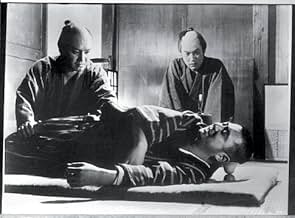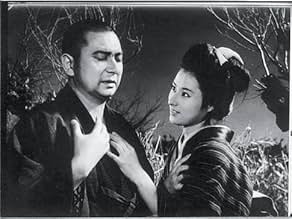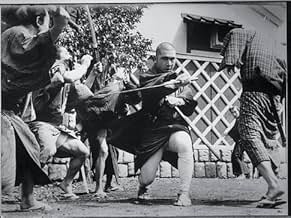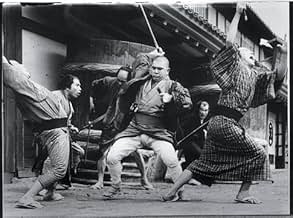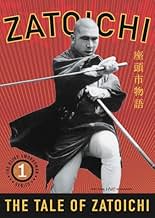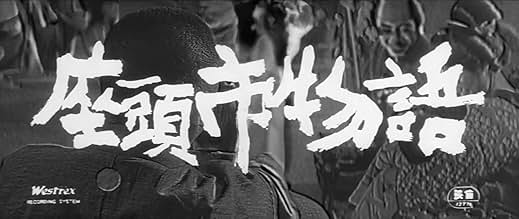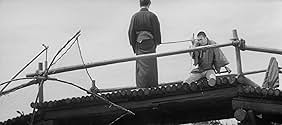Die Abenteuer eines blinden, spielsüchtigen Masseurs, der zufällig auch ein Meister des Schwertkampfes ist.Die Abenteuer eines blinden, spielsüchtigen Masseurs, der zufällig auch ein Meister des Schwertkampfes ist.Die Abenteuer eines blinden, spielsüchtigen Masseurs, der zufällig auch ein Meister des Schwertkampfes ist.
- Regie
- Drehbuch
- Hauptbesetzung
- Auszeichnungen
- 1 Nominierung insgesamt
- Masakichi
- (as Toshirô Chiba)
- Yahei
- (as Yoshito Yamaji)
Empfohlene Bewertungen
Too bad the camera works don't quite follow up. The scope is 70mm (or close to it), but I could settle with less if the cameraman (I suspect they didn't have one) didn't cut off the heads all the time. The use of zoom-lens sometimes works and sometimes don't. One time zooming in on Tane-san for instance was very dramatic. Intense was also the battle scenes. Very good.
Zatoichi is a good character and the actor playing him is fitting. The story is good and makes for an intriguing film despite some flaws. In all respects I think its inferior to Sanjuro though.
This is my first Zatoichi and I will check out other entries in the series for sure (at least the Kitano "Zatoichi" from 2003 is easy to get hold on).
Others have described this movie well, so, I will only add something that I noticed while watching the scene of Ichi fishing with the ailing samurai. What made the scene so compelling was not what was said, but, the effective use of silence between them. The pauses in dialog were masterful, especially the long lull at the end of the sequence. It reminded me of some of Kurosawa's work.
I recommend this movie, not as the first Zatoichi that you see; but, rather as something to experience after a few of the more exciting movies...after you've developed a relationship with the character.
In this first episode of a series that covered two decades, Ichi is hired by a gang leader to defeat a consumptive samurai who's been imported by a rival gang. The two swordsmen meet while fishing and become friends, but destiny has decreed they must fight each other, and only one will survive
Fans of action movies may be disappointed with ZATOICHI MONOGATARI, because there's virtually no fighting for the movie's first hour. Instead, there's unusual emphasis on character development. Ichi himself receives much of the attention, and Shintaro Katsu (who also played the role in all the sequels) presents us with a subtle, complex portrayal of the reluctant mercenary. His scenes with the enamored sister of one of the gang members and with the mortally sick samurai are played with great sincerity without becoming sentimental. These two characters are also sensitively portrayed. Even many of the crooks are carefully established as individuals.
The climax won't disappoint action fans, though. Beginning with a flurry of gang skirmishes, frenetically edited to a throbbing score, it ends on a bitter and almost tragic note after the inevitable confrontation between the two protagonists.
Director Kenji Misumi embellishes the slow build-up with a succession of captivating black-and-white compositions and attention to period detail. A degree of pace is maintained by making scene transitions with cuts rather than dissolves. Sets are given visual depth by being framed with foreground objects. The camera is often positioned slightly above or below the characters' eye-lines. Very precise interior lighting creates interesting patterns on and around the actors. By contrast, the daytime exteriors are overly bright and tend to disrupt the mood.
Far from being a typical samurai movie, ZATOICHI MONOGATARI is an unusually somber yet effective period drama, and probably the best entry in the long series it inaugurated.
The reasons why the Zatôichi franchise enjoys such an enormous cult-status are numerous, but I will stick to the most important ones. The eponymous hero, Zatôichi must be the most likable character ever in cinema to work as a hired sword. Zatôichi, a blind masseur, has obtained his sword skills because he was tired of being looked down upon by others, as usual for blind people in Feudal Japan. Due to his excellent sword-skills, he makes a good living as a hired swordsman. His senses of smell and hearing are as excellent as his swordsmanship, which makes him one of the most powerful swordsmen. Even so, Zatôichi is a kind, gentle and humorous man by nature, who will rather solve problems otherwise than having to kill someone. Shintaro Katsu is brilliant in the role of his life, and I cannot imagine for anyone else to fit the role like Katsu did. Cult-filmmaker Takeshi Kitano (of whom I am a great fan) took a new turn on the role in 2003 - Katsu had passed away in 1997 - and did so greatly. Yet, to me, the only true Zatoichi will always be Shintaro Katsu. This first film in the series is one of only two that were filmed in black and white, and it already epitomizes what makes the brilliance of the series. "Zatôichi Monogatari" mixes Smurai Action with Comedy, Drama and philosophical elements. The film begins with the crafty Zatôichi, who tricks a bunch of fellow gamblers into underestimating him... The film marks the beginning to a great and highly successful series that may not be missed by any lover of Japanese cinema. I had seen several other "Zatôichi" films with Katsu, as well as the 2003 film with (and by) Kitano before seeing this one. The action is great in this first film, but it is the plot that outweighs the fighting by far. Overall, "Zatôichi Monogatari" is a fantastic piece of cult-cinema and everybody even remotely interested in Japanese films must see it.
Wusstest du schon
- WissenswertesThe "mon" coins used by the gamblers were made of either copper or iron and were the lowest-denomination currency in Japan until the yen system was established in 1870. The "ryo" paid to Zatoichi were gold and were worth many thousands of "mon." The Currency Museum of the Bank of Japan estimates that one "ryo" would be worth roughly $1200 to $1300 now.
- PatzerIn the moonlit scene by the pond, Tane tells Zatoichi that she has a facial mole exactly like his. But neither character has any such mole.
- Zitate
Tane: You have a mole here. I wonder if it's a lucky mole. I have one just like it. They say it means I'll have lots of children.
Zatôichi: It's a lucky mole.
Tane: What would I do with so many children.
Zatôichi: Just don't raise them to be yakuza.
Tane: I won't. But why do you say that?
Zatôichi: Because to be a yakuza is a foolish way to live.
Tane: Then why don't you live a decent life?
Zatôichi: It's like being stuck in a bog. It's not easy to pull yourself out once you've fallen in.
- VerbindungenFeatured in Best in Action: 1961 (2018)
Top-Auswahl
Details
- Erscheinungsdatum
- Herkunftsland
- Sprache
- Auch bekannt als
- Повість про Затоічі
- Produktionsfirma
- Weitere beteiligte Unternehmen bei IMDbPro anzeigen
- Laufzeit1 Stunde 36 Minuten
- Farbe
- Sound-Mix
- Seitenverhältnis
- 2.35 : 1
Zu dieser Seite beitragen


